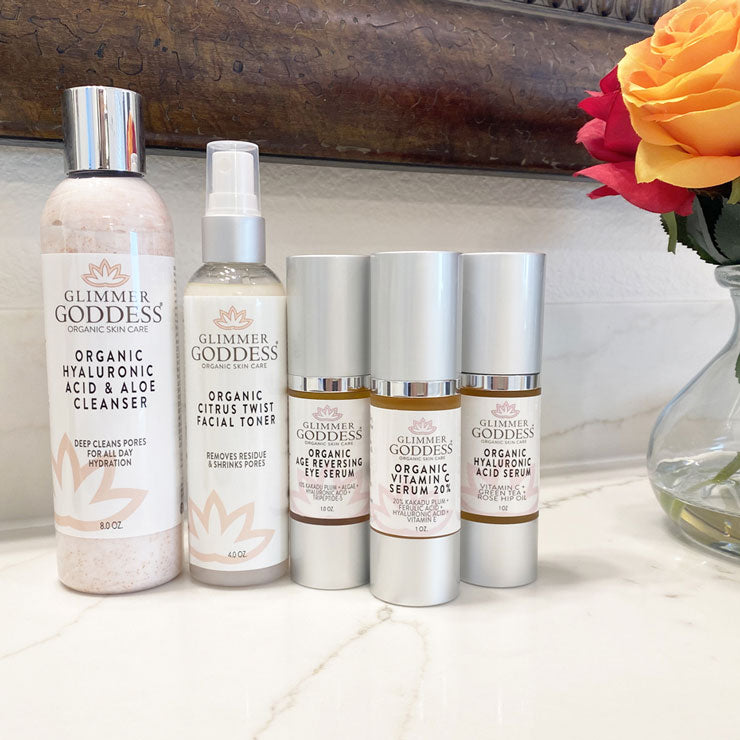
Should You Wear Sunscreen Daily? # Facts to Know
Daily sunscreen use is essential for maintaining healthy skin and preventing damage from harmful UV rays. This blog explores the risks of UV exposure, the protective benefits of sunscreen, and how to incorporate it into your daily skincare routine. By understanding these points, you can secure your skin's health and youthfulness.
Unlocking the Sun's Secrets: Navigating the Risks and Benefits of UV Exposure
What are the risks of UV exposure?
The sun's ultraviolet (UV) rays are a double-edged sword, providing essential health benefits while also posing significant risks to our skin. Understanding the potential dangers of UV exposure is crucial in developing a balanced approach to sun-safe practices.
The dark side of UV exposure
- UV radiation can damage the DNA in our skin cells, leading to the development of precancerous and cancerous lesions.
- Prolonged or excessive UV exposure can accelerate the aging process, causing premature wrinkles, age spots, and a leathery texture to the skin.
- UV rays can also trigger inflammatory reactions, such as sunburns, which can be painful and increase the risk of long-term skin damage.
- Overexposure to UV radiation has been linked to an increased incidence of certain eye conditions, including cataracts and macular degeneration.
How does sunscreen protect your skin?
Sunscreen is a vital tool in the arsenal against the harmful effects of UV radiation. By understanding how it works, we can better appreciate its importance in maintaining healthy, youthful skin.
The science behind sunscreen
- Sunscreens contain active ingredients that absorb, scatter, or reflect UV rays, preventing them from penetrating the skin.
- Chemical sunscreens work by absorbing UV radiation and converting it into heat, which is then released from the skin.
- Mineral sunscreens, on the other hand, use physical blockers like zinc oxide or titanium dioxide to reflect and scatter UV rays.
- Broad-spectrum sunscreens protect against both UVA and UVB rays, providing comprehensive coverage against the sun's harmful effects.
Is sunscreen necessary on cloudy days?
Many people mistakenly believe that sunscreen is only required on sunny days, but the truth is that UV radiation can still penetrate through cloud cover, making sun protection a year-round necessity.
The myth of the "cloudy day" exception
- Up to 80% of the sun's UV rays can pass through clouds, meaning that you're still at risk of sun damage even on overcast days.
- Snow, sand, and water can all reflect UV radiation, increasing your exposure and the need for adequate sun protection.
- Even on days when the sun is not visibly shining, the UV index can still be high, indicating a significant risk of skin damage.
- Consistent use of sunscreen, regardless of the weather, is essential in maintaining long-term skin health and reducing the risk of sun-related issues.
Unlocking the sun's secrets requires a nuanced understanding of the risks and benefits of UV exposure. By embracing sun-safe practices, including the regular use of broad-spectrum sunscreen, we can enjoy the sun's health-promoting effects while minimizing its potential dangers. Ultimately, a balanced approach to sun exposure is the key to maintaining vibrant, youthful skin for years to come.
The Ultimate Sunscreen Guide: Protecting Your Skin with Confidence
What should you look for in a sunscreen?
When it comes to protecting your skin from the sun's harmful rays, choosing the right sunscreen is crucial. With so many options on the market, it can be overwhelming to know what to look for. In this section, we'll explore the key factors to consider when selecting a sunscreen that will keep your skin safe and healthy.
Choosing the right sunscreen can be a daunting task, but it's an essential step in maintaining healthy, radiant skin. Here's what you should look for:
- Broad Spectrum Protection: Opt for a sunscreen that provides protection against both UVA and UVB rays. These two types of ultraviolet radiation can both contribute to skin damage, premature aging, and an increased risk of skin cancer.
- SPF (Sun Protection Factor): The SPF rating indicates how effectively the sunscreen will protect your skin from UVB rays. Experts recommend using a sunscreen with an SPF of at least 30, but higher SPF values can provide even greater protection.
- Water Resistance: If you'll be engaging in activities that involve water or sweating, choose a water-resistant sunscreen to ensure it stays on your skin and continues to provide protection.
- Skin Type Suitability: Consider your skin type and choose a sunscreen that is formulated for your specific needs. For example, if you have oily or acne-prone skin, look for a non-comedogenic (non-pore-clogging) formula.
- Ingredients: Familiarize yourself with the active ingredients in the sunscreen, as some people may have sensitivities or allergies to certain chemicals. Mineral sunscreens, which contain zinc oxide or titanium dioxide, are often a good choice for those with sensitive skin.
Are mineral sunscreens better than chemical ones?
When it comes to sunscreen, there's an ongoing debate about the merits of mineral vs. chemical formulas. Both types have their advantages, and understanding the differences can help you make an informed decision about which one is right for your skin.
Mineral and chemical sunscreens work in different ways to protect your skin from the sun's harmful rays:
- Mineral Sunscreens: These sunscreens use physical blockers, such as zinc oxide or titanium dioxide, to reflect and scatter UV radiation away from the skin. Mineral sunscreens are generally considered gentler and less irritating, making them a good choice for those with sensitive skin.
- Chemical Sunscreens: These sunscreens contain organic compounds, such as oxybenzone or avobenzone, that absorb UV radiation and convert it into heat, which is then released from the skin. Chemical sunscreens tend to be more lightweight and less visible on the skin, but they may be more prone to causing irritation or allergic reactions in some individuals.
When it comes to choosing between mineral and chemical sunscreens, there is no one-size-fits-all answer. The best approach is to consider your skin type, any sensitivities or allergies, and your personal preferences. Some people may find that a combination of the two, known as a "hybrid" sunscreen, provides the best balance of protection and comfort.
How do SPF ratings work?
Understanding the sun protection factor (SPF) is crucial when it comes to choosing the right sunscreen. This number can be a bit confusing, but it's an important indicator of how well a sunscreen will protect your skin from the sun's harmful rays.
The SPF rating on a sunscreen bottle tells you how much of the sun's UVB radiation it can block:
- SPF 30: Blocks 97% of UVB rays
- SPF 50: Blocks 98% of UVB rays
- SPF 100: Blocks 99% of UVB rays
It's important to note that the SPF rating only measures protection against UVB rays, which are responsible for sunburns. To ensure comprehensive protection, you'll also want to look for a sunscreen that provides broad-spectrum protection, meaning it shields against both UVB and UVA rays.
Additionally, the SPF rating assumes that you're applying the sunscreen correctly. Most people don't apply enough sunscreen, which can significantly reduce the level of protection. Experts recommend using about 1 ounce (2 tablespoons) of sunscreen to cover your entire body, and reapplying every 2 hours, or more frequently if you're swimming or sweating.
Choosing the right sunscreen is a crucial step in protecting your skin from the sun's harmful effects. By understanding the key factors to consider, such as broad-spectrum protection, SPF ratings, and the differences between mineral and chemical formulas, you can make an informed decision and keep your skin safe and healthy all year round.
Sun Protection: Your Everyday Skincare Essential
When should you apply sunscreen?
Sunscreen is a vital component of any comprehensive skincare regimen, yet many people struggle to incorporate it consistently into their daily lives. Knowing when to apply sunscreen is key to ensuring optimal protection against the harmful effects of UV radiation.
Sunscreen should be applied daily, regardless of the weather or time of year.
- Even on cloudy or overcast days, up to 80% of the sun's UV rays can still penetrate through the clouds and cause damage to your skin.
- The sun's rays are present year-round, and can be just as intense in the winter as in the summer.
- Applying sunscreen should be a non-negotiable step in your morning routine, right after cleansing and before makeup or other skincare products.
How can you incorporate sunscreen into your skincare routine?
Integrating sunscreen into your existing skincare regimen doesn't have to be complicated. With a few simple adjustments, you can ensure that your skin is protected from the sun's harmful effects throughout the day.
Choose a broad-spectrum sunscreen with an SPF of 30 or higher.
- Broad-spectrum sunscreens protect against both UVA and UVB rays, which is crucial for comprehensive sun protection.
- An SPF of 30 or higher is recommended by dermatologists to effectively block a significant percentage of the sun's rays.
- Consider your skin type and preferences when selecting a sunscreen formula, whether that's a lightweight lotion, a hydrating cream, or a matte, oil-free version.
Apply the recommended amount of sunscreen.
- Most people apply only 25-50% of the recommended amount of sunscreen, which can significantly reduce its efficacy.
- The general guideline is to apply approximately 1 ounce (a shot glass full) to cover your entire body.
- For the face alone, aim for a nickel-sized amount to ensure even, thorough coverage.
Reapply sunscreen every 2 hours, or more frequently if swimming or sweating.
- Sunscreen wears off over time, especially with activity, so it's crucial to reapply throughout the day.
- Set a timer on your phone or watch to help you remember when it's time to reapply.
- Keep a travel-sized sunscreen in your bag or car for easy access and consistent reapplication.
What other steps can enhance sun protection?
While sunscreen is the foundation of effective sun protection, incorporating additional sun-smart habits can further safeguard your skin from the damaging effects of UV exposure.
Wear protective clothing and accessories.
- Choose lightweight, long-sleeved shirts, pants, and wide-brimmed hats to cover exposed skin.
- Opt for tightly-woven, dark-colored fabrics that provide greater UV-blocking capabilities.
- Invest in UV-protective sunglasses to shield your eyes and the delicate skin around them.
Seek shade whenever possible.
- Limit direct sun exposure during the peak UV hours of 10 AM to 4 PM, when the sun's rays are most intense.
- Find shady spots under trees, umbrellas, or canopies when spending time outdoors.
- Plan outdoor activities for early morning or late afternoon/evening when the sun is less harsh.
Monitor the UV index and adjust your sun protection accordingly.
- Check the daily UV index in your area and plan your sun exposure and protection based on the forecast.
- On days with a high or very high UV index, be extra diligent with your sunscreen application and other sun-safe habits.
Incorporating sunscreen into your daily routine is one of the most crucial steps you can take to safeguard your skin's health and appearance. By understanding the importance of consistent, proper sunscreen use, and complementing it with additional sun-smart habits, you can effectively shield your skin from the damaging effects of UV radiation and maintain a radiant, youthful complexion for years to come.
Unlock Your Skin's Radiant Potential with Our Transformative Skincare Collection
Organic Illuminating Fruit Stem Cell Glow CC Cream Reef-Safe SPF 45 🌟
Experience the ultimate in skincare with our Organic Illuminating Fruit Stem Cell Glow Cream. This advanced formula harnesses the power of nature's finest ingredients to deliver a radiant complexion while providing superior protection.
Unlock the secrets to a luminous, youthful glow with this revolutionary Fruit Stem Cell CC Cream.
- Powerful Fruit Stem Cells: Ligonberry, orchid, and orange fruit stem cells work together to reduce wrinkles, spots, firmness loss, dehydration, and roughness.
- Hydrating and Conditioning: Rosemary leaf extract and algae extract deeply hydrate and condition your skin for a smoother, softer feel.
- Advanced Hydration: Matrixl 3000, Argirelene, and Tripeptide-5 instantly boost hydration levels, minimizing fine lines and wrinkles.
- Brightening Effect: Ultrafine brightening pearls diffuse light to enhance luminosity, while glimmering mica minerals impart a universally flattering glow.
- High SPF Protection: Enjoy Reef-Safe SPF 45 protection against harmful UV rays, ensuring your skin stays shielded from sun damage.
Organic Reef-Safe Sunscreen - Broad Spectrum SPF 40 🌊
Introducing our Glimmer Goddess Organic Reef-Safe Sunscreen, a superior choice for your skin and the environment.
Indulge in the ultimate sun protection that's kind to both you and the planet.
- Crafted with Certified Organic Ingredients for a gentle yet effective shield against UVA/UVB rays.
- Features un-coated non-nano Zinc Oxide, along with natural plant oils like red raspberry seed oil and pomegranate seed oil.
- Provides maximum sun protection while deeply moisturizing your skin.
- Lightweight and quick-drying formula absorbs rapidly without leaving a greasy residue.
- Waterproof and sweat-resistant for at least 40 minutes, perfect for active lifestyles.
Organic Vitamin C Face Cream Reef-Safe SPF 30 - Brightens and Tightens Skin 🍊
Organic Vitamin C Face Cream SPF 30 is formulated with natural ingredients to restore a healthier, brighter complexion. Sea Buckthorn and Pomegranate Oil help even tone and firm skin, while Vitamin C locks in moisture for a smoother look. Broad-spectrum SPF 30 offers protection against UVA and UVB rays.
Unlock the power of nature's brightest and tightest with this transformative Vitamin C Face Cream.
- Sea Buckthorn and Pomegranate Oil help even tone and firm skin for a smoother, more youthful appearance.
- Vitamin C locks in moisture, maintaining a healthy, radiant glow.
- Broad-spectrum SPF 30 shields your skin from harmful UVA and UVB rays, preventing sun damage.
- Crafted with only natural, reef-safe ingredients for a gentle yet effective formula.
- Can only be shipped in the jar version from October 1st to April 1st due to the delicate nature of the formula.
Prepare to be captivated by our transformative skincare collection, where nature's most potent ingredients converge to unlock your skin's radiant potential. From the illuminating Fruit Stem Cell Glow Cream to the reef-safe Vitamin C Face Cream and our broad-spectrum sunscreen, each product is meticulously crafted to nourish, protect, and enhance your complexion. Discover the secrets to a glowing, youthful appearance that radiates confidence and beauty from within. Indulge in the power of nature and let your skin shine brighter than ever before. 💫
Q&A
What are the risks of UV exposure?
UV exposure can cause DNA damage in skin cells, leading to precancerous lesions, accelerate aging with wrinkles and age spots, trigger painful sunburns, and increase the risk of eye conditions such as cataracts.
How does sunscreen protect your skin?
Sunscreen contains active ingredients that absorb, reflect, or scatter UV rays, preventing them from penetrating the skin. Chemical sunscreens absorb UV radiation, while mineral sunscreens use physical blockers like zinc oxide.
Is sunscreen necessary on cloudy days?
Yes, UV rays can penetrate clouds, with up to 80% of sunlight getting through. Sunscreen is essential even on overcast days to protect against skin damage.
What should you look for in a sunscreen?
Look for broad-spectrum protection, an SPF of at least 30, water resistance, ingredients suitable for your skin type, and consider mineral formulations for sensitive skin.
How do SPF ratings work?
SPF ratings indicate how much UVB radiation is blocked. SPF 30 blocks about 97% of UVB rays, while SPF 50 blocks 98%. It's important to apply the correct amount for effective protection.
Incorporating sunscreen into your daily routine is vital for safeguarding your skin's health and appearance. By understanding the significance of consistent sunscreen use and complementing it with additional sun-smart habits, you can effectively protect your skin from UV damage and maintain a youthful, radiant complexion for years to come.










